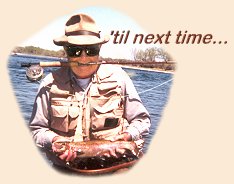
| ||
|
October 20th, 2003
|
|
Q. From W. Powell. Hi Doc: For twenty five years I've been fishing for trout during the winter and for more than half of that time I've had doubts about the survival rate of fish released when the water temperatures are so cold that the fish's metabolic functions are lower and the forage levels are severely decreased. Although I experience my most productive fishing from November through March, I would certainly rather discontinue the practice than kill fish. Have you any light to shed on this issue?
A.
First of all, I'll relieve your concerns; enjoy your
winter fishing. Here's why.
We're looking at several interacting factors here
that influence the potential impact of winter trout
fishing. Let me discuss these with you.
Evidence from some studies in southern Ontario revealed
that during winter, trout remained thin despite having
full stomachs. In other words, although food is
plentiful (see below) and the trout feed regularly,
their metabolic rate is too slow to assimilate the
food and convert it to body tissue. Similar results
have been found in California and elsewhere in Canada.
This would indicate that trout, being in poorer
condition during winter, might be more susceptible
to fishing impacts.
On the other hand, I talked to two local fisheries
biologists (one state and one university) about your
question. The state biologist said that in the
fisheries he supervises in this area, he sees no
detrimental impact of winter fishing on local trout
populations. The key word here is "populations."
Biologists think in terms of overall fish populations
when interpreting impacts, whereas individual anglers
are probably concerned with impact on individual fish
(is the one I just released going to make it or not?)
as well as what impact they may be having on the
overall population. His overall reaction based on
his experience was to go ahead and enjoy your winter
angling. The university biologist thought that
factors favoring trout survival during winter were
related to the fact that trout are more lethargic
in colder water, fight less, and thus experience
less stress than those fighting in warmer
temperatures.
Another point in this respect is the problem of
trying to answer your question in generalities
without knowing where you fish or the type of
water. Whereas the state biologist found no
problems here, I expect that if I called enough
biologists, I'd find one who did indeed find some
negative impact of winter fishing on a particular
population. In other words, different populations
may respond differently. For instance, tailwater
fisheries, which experience fairly uniform temperature
conditions, will probably show no impact to seasonal
differences in angling.
Colder water holds more dissolved oxygen; thus,
oxygen saturation is the norm at this time of
the year so this shouldn't add to any stress.
Further, the very fact that the fish's metabolic
functions slow down possibly indicates that they
are less susceptible to stress at this time.
One point the state biologist did make, however,
was this. He did some studies on individual fish
survival from handling in winter conditions,
particularly ice fishing. For ice fishing,
the longer a fish was exposed to freezing air
temperatures, particularly the gills, the less
chance it had for survival. Thus, the less you
expose the fish you catch to the air when it is
freezing, the better their chance for survival.
Contrary to your belief that forage levels are low,
this is usually the time of greatest abundance for
immature aquatic insects. Remember, most insects
emerge and deposit their eggs during the warmer
months. The eggs hatch and the developing instars
grow during winter, reaching their maximum size in
spring and summer just prior to emergence. Thus,
highest populations of immatures are present during
the winter months, although they may be smaller in
size initially. As populations develop, the nymphs
and larvae get larger and fewer in numbers as natural
mortality occurs.
~ C. E. (Bert) Cushing, aka Streamdoctor 105 W. Cherokee Dr. Estes Park, CO 80517 Phone: 970-577-1584 Email: streamdoctor@aol.com
|
| If you would like to comment on this or any other article please feel free to post your views on the FAOL Bulletin Board! |
 The 'Stream Doctor' is a retired professional stream ecologist and
author, now living in the West and spending way too much time
fly-fishing. You are invited to submit questions relating to
anything stream related directly to him for use in this Q & A Feature
at
The 'Stream Doctor' is a retired professional stream ecologist and
author, now living in the West and spending way too much time
fly-fishing. You are invited to submit questions relating to
anything stream related directly to him for use in this Q & A Feature
at